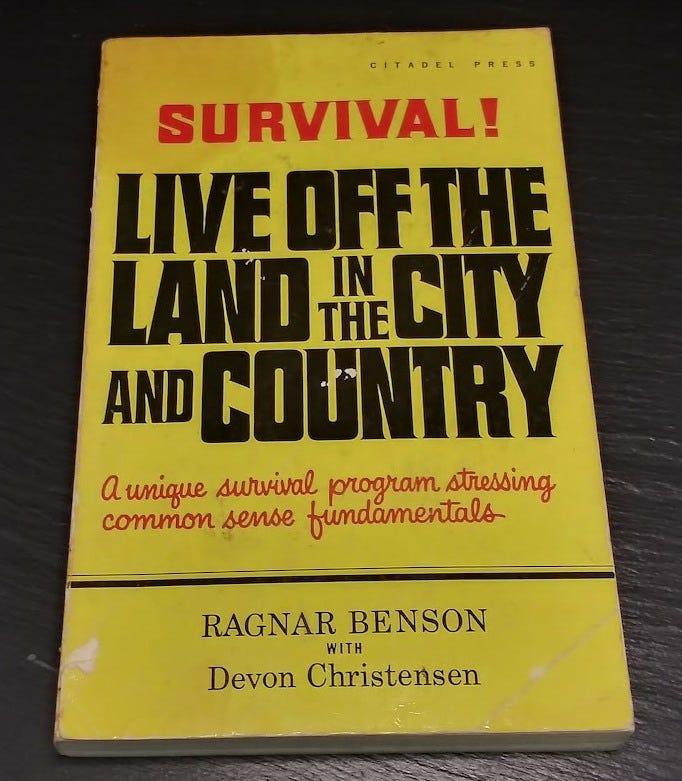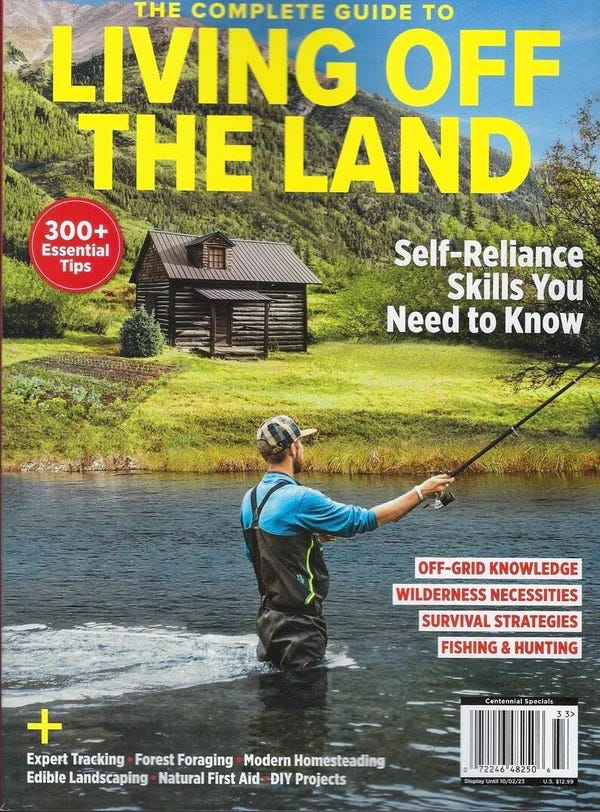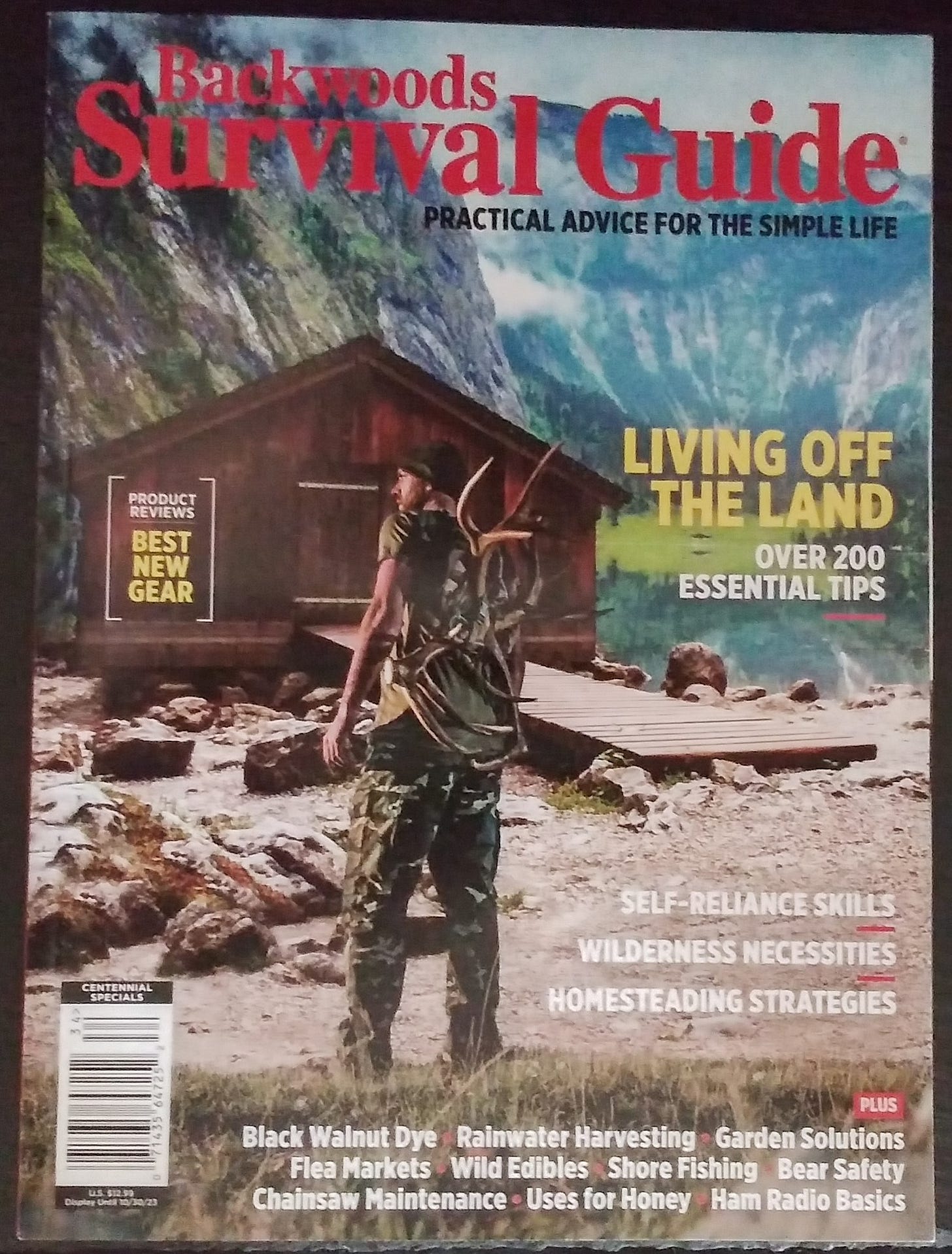Hey everyone, thanks for checking out the newsletter this week. I’m back to a normal work flow, more or less, and it feels good to be productive again. In the last week, I’ve written a handful of articles, edited all of the layouts for Prepper Survival Guide 20, and made some plans for projects I’m tackling in the next few months.
Our middle son heads back to college in a month. Given that we lost about a month of summer due to my various health issues, we’re trying to cram in as much fun as we can over the next few weeks. We won’t have time to get to everything we’d wanted to do this summer, but we’re going to do our best.
* * *
Tourniquets are a vital component in a trauma kit, but you need to be careful about the ones you buy. Dr. Joe Alton recently posted a great article about the differences between a genuine Combat Application Tourniquet (CAT) and a lookalike.
* * *
Those of you who have been around the survival community (or whatever you want to call it) for a while are probably familiar with the name Ragnar Benson. For those who haven’t heard of him before, he was a very prolific writer in the 1980s and 1990s. Many of his books were published by Paladin Press, an outfit that specialized in things like improvised weapons, martial arts, survivalism, and similar topics. Benson wrote over 40 books on a range of topics, including explosives, emergency medicine, and homesteading.
I picked up LIVING OFF THE LAND IN THE CITY AND COUNTRY back in 1984 or thereabouts, and I still have it today. I came across it recently while I was looking for something else in my book collection. I couldn’t even guess at how many times I’ve read this book. It was one of the very first survival manuals I ever bought. It dawned on me a few days ago that Benson didn’t just contribute to my preparedness education, he also influenced my writing style a bit. His books, like mine, tend to have a conversational sort of tone to them, rather than just being dry textbook sorts of endeavors.
His books are all out of print today, as far as I know, so you’ll need to find them via eBay or other secondary market sources. That said, they’re definitely worth the effort to find.
* * *
I wrote this a couple of years ago and it is still true today. "While having emergency gear with you and being proficient with its use is absolutely important, even more critical is understanding that the best scenario is one in which that gear goes unused. In other words, if the conditions are sketchy, don’t push your luck simply because you think you have what it takes to survive."
* * *
Some of you may recall the Living Off the Land special edition magazine we did a couple of years back. For those who missed it, they’ve reissued it. Here’s the cover.
You’ll find it anywhere magazines are sold, just like our other publications. This one has some great articles on tracking, fishing, hunting, foraging, and even ways to include wild food into your family’s dinner routine.
* * *
Like many of us, I was raised to be respectful and to use good manners. Please, thank you, you’re welcome, and more weren’t just commonplace, they were expected. That’s not a bad thing, of course, and we’ve tried to instill those same manners and courtesies into our own children, as I’m sure many of you have done.
However, there is one drawback to keep in mind. Criminals can and will use those manners against you. This is commonly employed against women more often than men, but it applies to both. When you’re raised to be cordial and courteous, it can make you uncomfortable to be direct or even rude. They know that, so they’ll push you into a corner, figuratively and sometimes literally, as you hem and haw trying to get around them.
Give yourself permission to be rude. Recognize that this is sometimes the best way to avoid further trouble. Here’s an example that I recently saw discussed online.
Single woman is at a gas station late in the evening, filling the tank on her car. Guy pulls up and gets out of his car. As he approaches her, he is polite enough, asking if she lives locally, as he thinks he got turned around trying to find his destination. Then he wants to know where she’s headed and, glancing in her car, asks if she’s alone? With each inquiry, he gets a little closer to her. Many times, the woman will try to be polite while also encouraging him to move along, which doesn’t usually work well.
A better approach might be to finish the transaction at the pump, get into the car, and drive away while saying little or nothing at all.
Rude? Yep.
Safe? Yes, which is the more important thing.
Of course, even being direct and rude could go south on you. But that’s when defense training and a good weapon might come into play. The idea here is to avoid trouble if possible.
* * *
We took our granddaughter on our hike again, and did another segment of the same rail trail we did last weekend. This section has a couple of bridges over small streams, which make for neat little scenic overlooks.
Survival Tip – Lemonade Lifestyle
I talk a fair bit about the mental side of prepping for a few reasons.
1) It almost always costs you nothing but time and energy.
2) Many aspects of it translate well for regular life.
3) It’s something that’s often overlooked by other instructors.
Like most families, ours has had its ups and downs over the years. We’ve dealt with financial troubles, health issues, and all manner of disappointments. That’s just part of life, y’know? But, the thing is, how we respond to adversity is critical to overcoming it. That goes for everything from having your picnic rained out to a blizzard causing a multi-day power outage.
It is said that there are five stages to grief:
· Denial
· Anger
· Bargaining
· Depression
· Acceptance
In a very real sense, this isn’t limited to anguish over the death of a loved one. I can tell you from experience that when you’re dealing with a personal financial crisis, you’ll go through all of those same stages.
“Nah, I can’t be that broke. There has to be money I’m forgetting I have.”
“Gah, this sucks! I hate not having any money!”
“Okay, maybe if I’m really good, the fates will drop some cash in front of me.”
“I hate my life. Everyone else gets to have fun and I’m just sitting here broke again.”
“Okay, I need to make a plan if this is ever going to change.”
When I was much younger and dealing with nearly constant financial problems, I’d go so far as to hope for a major societal collapse, figuring that scavenging for food would have to be easier than dodging calls from collection agencies.
The best advice is to try to burn through the first four stages as quickly as possible. That’s where the Lemonade Lifestyle comes into play. This is a phrase my wife coined some time ago. Basically, we always found ourselves trying to “turn lemons into lemonade” when bad things happened. In other words, accept what’s happening and look for the positives.
For example, the power blips off and, based on the weather conditions, it probably isn’t coming back on for a while. While yeah, it sucks that you can’t watch Netflix and finish bingeing Cobra Kai, this is a great opportunity for you to spend some time together as a family, maybe playing a board game, doing a puzzle, or putting together a Lego set. It is also a good time for you to test out some of your emergency gear, like lanterns and flashlights.
The point here is that your outlook will shape your actions. If you just fall apart when a crisis hits, it’ll be that much harder for you to actually put your preparedness plans into motion. I’m not suggesting that a disaster is a great time to blow sunshine and rainbows up everyone’s butts. However, concentrating on the fact that you took the time to craft those plans just in case this very thing were to happen will hopefully give you the oomph you need to get moving.
You can’t change what happened, you can only change how you respond to it. You can either concentrate on just how much lemons suck, or you can use them to make lemonade. Looking for the positives, or at least the not-so-bads, can only help.
Prepper Survival Guide and Backwoods Survival Guide
For those new to my little corner of the Internet, I am the Editor in Chief for both Prepper Survival Guide and Backwoods Survival Guide magazines. Here are the covers for the current issues that are available in stores right now.
You can find them just about anywhere magazines are sold, including:
Walmart
Sam's Club
Costco
Publix
Walgreens
Rite Aid
CVS
Tractor Supply
Fleet Farm
Barnes & Noble
At this time, there are no subscriptions available. Both magazines are newsstand only and print only, no electronic editions.
Questions, Comments, Complaints, Concerns?
I am always just an email away - jim@survivalweekly.com.







